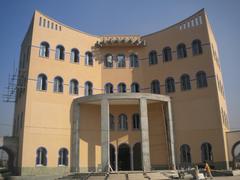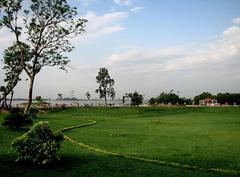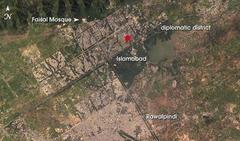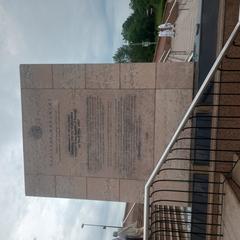Nicholson’s Obelisk: Visiting Hours, Tickets, and Comprehensive Guide to Islamabad’s Colonial Landmark
Date: 04/07/2025
Introduction
Nicholson’s Obelisk is a prominent colonial-era monument located at the Margalla Pass near Islamabad, Pakistan. Erected in 1868, this 40-foot granite tower commemorates Brigadier-General John Nicholson, a British military officer renowned for his role during the Indian Rebellion of 1857. The monument stands as a symbol of British colonial legacy, overlooking the historic Grand Trunk Road and offering panoramic views of the Margalla Hills. Its location near major historical sites such as Taxila and the Margalla Hills National Park makes it a compelling destination for history buffs, architecture enthusiasts, and travelers seeking to explore Islamabad’s rich heritage.
Visitors can explore Nicholson’s Obelisk free of charge during daylight hours. The site, while modest in amenities, provides peaceful hiking opportunities, excellent photographic vantage points, and insight into the region’s complex colonial past. This guide covers everything you need to know, from historical context and architecture to visitor information, directions, and tips for making the most of your trip.
For further details and historical background, see Dawn, Pakistan Today, and the Islamabad Tourism Board.
Table of Contents
- About Nicholson’s Obelisk
- Architectural Features
- Historical and Colonial Context
- Visiting Hours and Ticket Information
- Directions and Accessibility
- Visitor Tips
- Nearby Attractions
- FAQs
- Preservation and Future Prospects
- Visuals and Maps
- Conclusion
- Sources
About Nicholson’s Obelisk
Nicholson’s Obelisk, also called Nicholson Monument Tower, is a granite structure built in 1868 near the Margalla Pass, approximately 40 kilometers from Islamabad. It honors Brigadier-General John Nicholson, who played a significant role in British campaigns in the Punjab and during the 1857 Siege of Delhi. The monument stands atop a hill, making it visible from the Grand Trunk Road and offering sweeping views of the region.
Architectural Features
- Structure: Tapering stone obelisk about 40 feet (12 meters) tall, designed in the classical style popular during the Victorian era.
- Materials: Constructed from locally sourced granite or limestone, with marble plaques bearing English inscriptions.
- Design Elements: The monument features a square plinth, marble plaques commemorating Nicholson, and a clean, vertical silhouette symbolizing solemn remembrance.
- Preservation: Managed by the Department of Archaeology and Museums, with regular maintenance and basic protective fencing. There is no public access to the interior of the monument.
Historical and Colonial Context
Nicholson’s Obelisk was constructed by the British colonial administration to memorialize Brigadier-General John Nicholson (1822–1857). Nicholson is both venerated and controversial—celebrated by the British for his military exploits but critiqued in modern times for his harsh methods during the 1857 Indian Rebellion (xploreopen.org; Wikipedia). The obelisk stands at a strategic pass that has been a gateway for trade, military campaigns, and cultural exchange for centuries, including the campaigns of Alexander the Great.
Its proximity to historical sites such as Taxila—a UNESCO World Heritage city—underscores its significance as both a marker of colonial power and a witness to the broader tapestry of South Asian history (Wikivoyage).
Visiting Hours and Ticket Information
- Hours: Open daily from sunrise to sunset (approximately 8:00 AM to 6:00 PM). While the monument is physically accessible at all hours, daylight visits are strongly recommended for safety and visibility.
- Tickets: Free entry; there are no ticket booths or entry fees. Donations toward preservation may be accepted at local visitor centers.
- Guided Tours: No official guided tours at the site, but local operators in Islamabad and Taxila occasionally include Nicholson’s Obelisk as part of their historical itineraries.
Directions and Accessibility
By Car
- From Islamabad: Approximately 30–40 minutes’ drive via Kashmir Highway merging onto the Grand Trunk Road.
- From Rawalpindi: Drive north on GT Road, passing Tarnol and Sangjani.
- From Taxila: Southeast on GT Road toward Islamabad; the monument is on the left before Margalla Pass.
By Public Transport
- Local buses and vans operate along GT Road but do not stop directly at the monument. The nearest stop is Sangjani; from there, a walk or rickshaw is required.
- Ride-hailing services such as Careem and Uber are available in Islamabad and Rawalpindi.
Parking and Facilities
- No formal parking; visitors park along the roadside or in nearby clearings.
- There are no on-site restrooms, cafes, or visitor centers—plan accordingly.
Accessibility
- The monument is reached via an uphill walk and a short staircase. There are no paved ramps, so access is challenging for those with mobility issues.
Visitor Tips
- Best Times: Visit in the morning or late afternoon for cooler temperatures and optimal lighting.
- What to Bring: Water, snacks, comfortable walking shoes, and a camera.
- Etiquette: Respect the monument and surrounding environment. Do not climb the obelisk or disturb inscriptions. Take all litter with you.
- Safety: Be cautious of nearby quarry operations and passing traffic on the GT Road.
Nearby Attractions
- Taxila Archaeological Sites: Ancient Buddhist and Greek ruins, museums, and monasteries (UNESCO).
- Margalla Hills National Park: Hiking trails, wildlife, and panoramic views of Islamabad.
- Wah Gardens: Mughal-era gardens, about 10 km away.
- Rawalpindi: A vibrant city with markets and historical architecture.
- Grand Trunk Road: Historic cobbled sections can be explored near the monument (The News).
Frequently Asked Questions (FAQ)
Q: What are the visiting hours for Nicholson’s Obelisk?
A: The monument is accessible daily from sunrise to sunset, typically 8:00 AM to 6:00 PM.
Q: Is there an entry fee?
A: No, entry is free for all visitors.
Q: Are guided tours available?
A: No official tours, but local guides from Islamabad or Taxila can be arranged.
Q: Is the site accessible for people with disabilities?
A: Access is difficult due to uneven terrain and a lack of paved paths or ramps.
Q: Are there facilities like restrooms or cafes?
A: No facilities on-site; the nearest amenities are in Sangjani, Islamabad, or Taxila.
Preservation and Future Prospects
Nicholson’s Obelisk is generally well-preserved, but nearby quarrying activities and lack of visitor facilities remain challenges. Heritage advocates recommend installing informational signage, seating, and basic amenities to enhance the visitor experience and promote responsible tourism (The News). Until improvements are made, visitors should prepare for a self-guided and self-sufficient trip.
Visuals and Maps
Alt text: Nicholson’s Obelisk towering against a clear sky at Margalla Pass near Taxila.
Interactive Map of Nicholson’s Obelisk and Nearby Attractions
Conclusion
Nicholson’s Obelisk stands as a powerful reminder of the region’s colonial history and a gateway to the broader heritage of the Islamabad and Taxila areas. Its striking architecture, commanding location, and historical associations make it a compelling stop for travelers, history enthusiasts, and photographers. With no entry fee and scenic surroundings, it is an easy addition to any Islamabad heritage itinerary. Plan your visit carefully, prepare for minimal facilities, and take time to reflect on the monument’s complex legacy.
For more travel tips, updates, and guides to Islamabad’s historical sites, download the Audiala app or visit the Islamabad Tourism Board.
Sources
- Dawn
- Pakistan Today
- Islamabad Tourism Board
- TravelerTrails
- National Army Museum
- XploreOpen
- The News
- UNESCO – Taxila
- Mapcarta: Nicholson’s Obelisk










